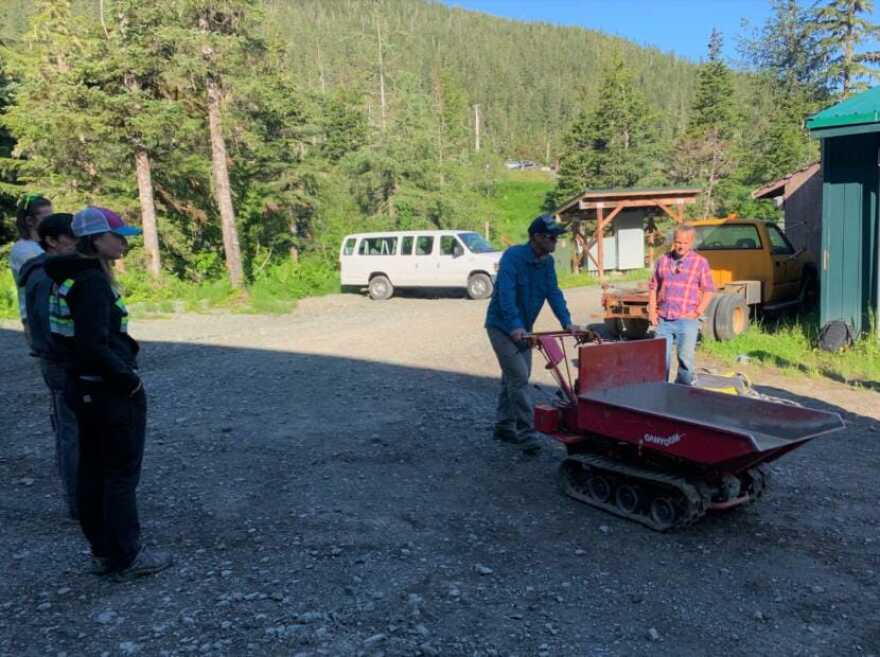Seasonal summer workers were laid off in droves this spring as it became clear that cruise ship passengers wouldn’t be coming to Juneau due to the pandemic.
Thanks to a Depression-era style conservation corp paid for with local CARES Act funds, some of them are now getting back to work.
On an unusually warm day, Kanaan Bausler demonstrated how to use a plate compactor on loose gravel outside the maintenance shed at the city-owned Eaglecrest Ski Area.
Some of the members of Juneau’s newly formed COVID-19 Conservation Corps gathered around him at a safe distance.
Dave Scanlan is the general manager of the ski hill, and helped propose the idea for the conservation corps to the city. He’s proud of the fact that two weeks after the Juneau Assembly approved funding, they were already putting people ready to work. He said they had more than 40 applicants for just 10 crew positions.
“We’ve got a helicopter pilot, a hiking guide, a boat captain (and) a mechanic,” he said. “So it’s a really great diversity of people that have been affected by COVID, and their typical summer work just doesn’t exist right now.”
The Assembly approved $1 million in CARES Act funding for the conservation corps in June. The money is shared between Eaglecrest, Juneau’s Parks and Recreation Department and Trail Mix, a local non-profit that improves trail access around the community.
Parks and Recreation reports hiring eight crew members from about 36 applicants. Trail Mix hired nine crew members and two leads. Trail Mix Executive Director Ryan O’Shaughnessy said they still have a few openings.
At Eaglecrest, the crew will focus mainly on mountain biking trails that make up just one element of the ski area’s ambitious summer development plan. The goal is to eventually turn the mountain into a year-round destination, catering to cruise ship passengers and independent travelers.
“And by the time we’ve learned how to control the pandemic, hopefully we’ll have this new infrastructure that will be available and ready to welcome our visitors back to Juneau,” Scanlan said.
This is their second day of training, and for many of them, it’s the first time they’ve been around this kind of equipment.
“It’s actually pretty fun. Lots of vibration. I feel like my arms are gonna be pretty, pretty loose at the end of the day,” said Jessica Davis after trying the compactor. She’s one of two women on the crew. “It’s a lot easier to move it around on flat ground than it appeared. But I’m sure getting up there and doing berms and stuff’s gonna be a whole ‘nother story.”
Davis has lived in Juneau for eight years. She spent the last four summers captaining an Allen Marine whale watching boat. Now she’ll be making a little under $20 an hour building trails four days a week on the mountain.
“I’m used to working up to 80-hour work weeks and just crazy hours, sometimes 2 a.m. starts in the morning for Tracy Arm tours,” Davis said. “Just having a normal set schedule and having a three-day weekend, it’s going to be really nice.”
She also works part-time at Eaglecrest in the winter teaching snowboard lessons, but she’s been out of work since Allen Marine laid off most of its seasonal staff in mid-March.
“It wasn’t really a for sure thing until Canada closed their borders to the cruise ships, and then we’re like ‘wow, there’s no ships, no tourists to go out and watch whales.’ So then it really kind of come to a realization that I needed to start looking for other work,” she said.
According to Rain Coast Data, Juneau’s unemployment rate was nearly 11% in May. That’s normally the time of year when tourism is really picking up, bringing in thousands of seasonal jobs for the five-month season.
Since the pandemic arrived early in the year, most of the non-resident workers that typically arrive in April and May never made it here. Still, hundreds of local residents who rely on seasonal work, like teachers or ski area employees, were out of luck.
Davis said she’ll miss the water while she’s up on the mountain this year. She’s used to seeing her favorite whales and their calves day-in and day-out during the summer.
The work will be an adjustment too.
“Definitely a lot more physical work. I’ll go from drinking coffee in the wheelhouse to hiking up mountains and shoveling and hauling rocks and dirt, nice and heavy equipment. So yeah, I’m excited for the change,” Davis said.
Eaglecrest plans to keep the crew working until snow falls again on the mountain.

